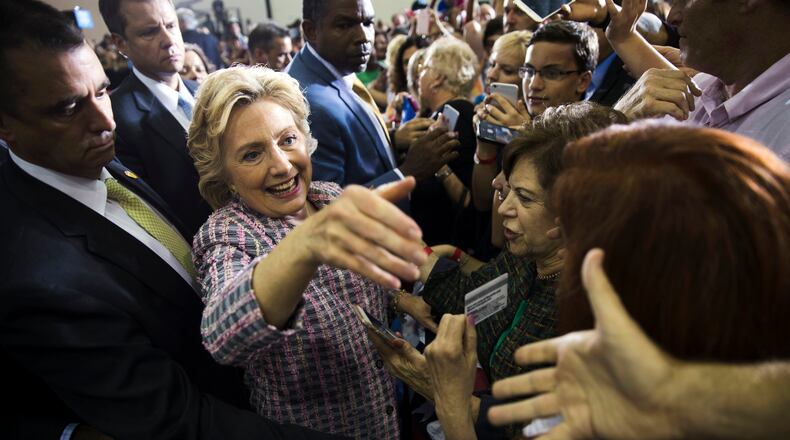Friends do not let friends delude themselves.
But if that kindness applies to Donald Trump, who – along with many eighth-graders — thinks that studying for the test actually clouds the brain, then it should extend to Democrats as well.
Especially the ones who keep telling us that Georgia is in play when it comes to the 2016 presidential contest.
If it ever was, there is every reason to assume this is no longer the case. In just over a month, barring a sudden shift in the Earth's polarity or the deletion of his Twitter account, Trump will likely claim the 16 votes that Georgia is entitled to send to the Electoral College. Hillary Clinton's Brooklyn headquarters is already charting a 30-day path to the White House that will send her through many other states – but not ours.
That’s her choice. It’s nothing personal. Just the business side of politics.
But if you want to blame somebody, blame Johnny Isakson. Or that fellow who’s running against him in the U.S. Senate race. No, not the Libertarian. That’s Allen Buckley.
I mean the Democrat with the cap. Jim Barksdale.
His campaign is in turmoil. This week, Barksdale replaced campaign manager Dave Hoffman with a Bernie Sanders acolyte, René Spellman. Two other top Democratic aides left as well.
According to RealClear Politics, a months' worth of polling gives Barksdale, the self-funding founder of an investment equity firm in Atlanta, an average showing in the mid-30s percentile range. In a 2014 off-year contest, Democrat Michelle Nunn collected 45 percent of the vote in her losing U.S. Senate bid against Republican David Perdue.
A first-time candidate embracing his outsider status, Barksdale has given many a gift to Republicans. His latest was a WUOG radio discussion about income inequality – quite the legitimate topic — that went awry.
“Capitalism just doesn’t work very well. You can’t grow when wages are declining. You can’t keep growing when people are getting more in debt,” Barksdale said.
With its cut-throat aspects, capitalism has had many critics, including antebellum plantation owners of the South and industrialist John D. Rockefeller Sr. himself. But such historical nuance is lost amid the accusations of “Socialist!” that erupt in a modern campaign.
Certain Democrats who have long-standing relationships with the affable Isakson have contributed to Barksdale's troubles. Former Gov. Roy Barnes has offered cash to the campaign of the Republican incumbent. U.S. Rep. John Lewis of Atlanta, a moral rallying point, has kept his distance.
But what, you might well ask, does this have to do with Hillary Clinton’s decision not to mount a serious bid in Georgia?
We may speak of presidential campaigns in terms of individuals, whether Trump, Clinton, or — when he’s polishing his foreign policy credentials – Libertarian Gary Johnson. But the race for the White House is really a team sport, state by state.
Let us take Georgia and North Carolina. Both are Southern states, obviously. Both have substantial urban populations and the same proportion of college-educated residents (28 percent in Georgia, 29 percent in the Tar Heel State). That’s where the political similarity ends.
North Carolina currently is in the midst of a “religious liberty” fight that Georgia has thus far ducked — thanks to Gov. Nathan Deal. (The North Carolina version focuses on gender and bathrooms, but the new law has much in common with attempts in Georgia.) Gov. Pat McCrory and U.S. Sen. Richard Burr, both Republican incumbents, have formidable Democratic challengers. Both contests are ranked as toss-ups.
Which means that when Clinton walks into North Carolina, she has three enthusiastic organizational networks that will magnify every dollar she spends there.
In Georgia, Clinton would have Barksdale.
In North Carolina, Trump has become a part of those statewide races — which makes for cost-efficient Democratic messaging. Burr has tried to keep his distance, but McCrory has warmly embraced the New York businessman.
In Georgia, this year’s Republican standard-bearer has successfully divorced himself from the presidential campaign. Isakson references Trump (and Clinton) only when pressed. In an interview on GPB’s “Political Rewind” on Friday, Isakson said he would vote for Trump, but also had some implicit criticism for his party’s presidential nominee.
“You’re never going to win a national election with just old white men for you. You’ve got to appeal to the cross-section and diversity of our country,” he said.
In one of the more curious developments of the U.S. Senate race, Barksdale has allowed Isakson to maintain this distance between himself and Trump. Possibly because the Democrat instead has chosen to attack Isakson on the topic of trade — an area of commonality between rebel voices for Trump on the GOP side, and Bernie Sanders among Democrats.
"Johnny Isakson has voted for every bad foreign trade deal since he got to Washington," Barksdale says in a TV ad released earlier this month.
Barksdale opposes the Trans-Pacific Partnership trade agreement as “a symbol of opposition to globalization.” Yet President Barack Obama has vowed to press for a vote by a lame-duck Congress on the TPP after the Nov. 8 election.
And Atlanta Mayor Kasim Reed, one of the most powerful voices in the Georgia Democratic party, has vowed to help Obama. No matter what Barksdale says.
This is why Hillary Clinton won’t be attempting to turn Georgia blue in October. To do that, there has to be a single playbook. And Georgia Democrats haven’t decided on one yet.
About the Author
The Latest
Featured




